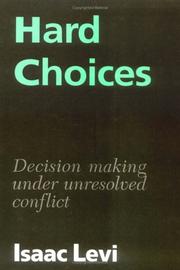| Listing 1 - 8 of 8 |
Sort by
|
Multi
ISBN: 1316335747 9781316335741 1108889654 1107115280 9781107115286 9781107535626 Year: 2021 Publisher: Cambridge Cambridge University Press
Abstract | Keywords | Export | Availability | Bookmark
 Loading...
Loading...Choose an application
- Reference Manager
- EndNote
- RefWorks (Direct export to RefWorks)
This landmark handbook collects in a single volume the current state of cutting-edge research on the capability approach. It includes a comprehensive introduction to the approach as well as new research from leading scholars in this increasingly influential multi-disciplinary field, including the pioneers of capability research, Martha C. Nussbaum and Amartya Sen. Incorporating both approachable introductory chapters and more in-depth analysis relating to the central philosophical, conceptual and theoretical issues of capability research, this handbook also includes analytical and measurement tools, as well as policy approaches which have emerged in the recent literature. The handbook will be an invaluable resource for students approaching the capability approach for the first time as well as for researchers engaged in advanced research in a wide range of disciplines, including development studies, economics, gender studies, political science and political philosophy.
Economic development --- Values. --- Freedom. --- Capabilities approach (Social sciences) --- Capability approach (Social sciences) --- Social sciences --- Civil liberty --- Emancipation --- Freedom --- Liberation --- Personal liberty --- Democracy --- Natural law --- Political science --- Equality --- Libertarianism --- Social control --- Axiology --- Worth --- Aesthetics --- Knowledge, Theory of --- Metaphysics --- Psychology --- Ethics --- Moral and ethical aspects. --- Moral and religious aspects --- Political philosophy. Social philosophy --- Sociology of the developing countries --- Microeconomics --- ontwikkelingsbeleid --- armoedebeleid --- Sen, Amartya
Multi
ISBN: 1108278655 1108265448 1108280994 1108417280 9781108417280 9781108404860 9781108265447 Year: 2018 Publisher: New York: Cambridge university press,
Abstract | Keywords | Export | Availability | Bookmark
 Loading...
Loading...Choose an application
- Reference Manager
- EndNote
- RefWorks (Direct export to RefWorks)
Nietzsche's controversial will to power thesis is convincingly rehabilitated in this compelling book. Tsarina Doyle presents a fresh interpretation of his account of nature and value, which sees him defy the dominant conception of nature in the Enlightenment and overturn Hume's distinction between facts and values. Doyle argues that Nietzsche challenges Hume indirectly through critical engagement with Kant's idealism, and that in so doing and despite some wrong turns, he establishes the possibility of objective value in response to nihilism and the causal efficacy of consciousness as a necessary condition of human autonomy. Her book will be important for scholars of Nietzsche's metaphysics, and of the history of philosophy and science more generally.
Metaphysics. --- Nihilism (Philosophy) --- Values. --- Will. --- Power (Philosophy) --- Authority --- Ethics --- Philosophy --- Cetanā --- Conation --- Volition --- Psychology --- Self --- Axiology --- Worth --- Aesthetics --- Knowledge, Theory of --- Metaphysics --- God --- Ontology --- Philosophy of mind --- Nietzsche, Friedrich Wilhelm, --- Nietzsche, Friedrich --- Nietzsche, Friederich --- Will --- Values --- Nietzsche, Friedrich, - 1844-1900 --- Kant, Immanuel, - 1724-1804 --- Hume, David, - 1711-1776

ISBN: 0521580870 052177411X 1139174851 9780521580878 9781139174855 9780521774116 Year: 1998 Publisher: Cambridge: Cambridge university press,
Abstract | Keywords | Export | Availability | Bookmark
 Loading...
Loading...Choose an application
- Reference Manager
- EndNote
- RefWorks (Direct export to RefWorks)
In this path-breaking book, economists and scholars from diverse disciplines use standard economic tools to investigate the formation and evolution of normative preferences. The fundamental premise is that an adequate understanding of how an economy and society are organized and function cannot be reached without an understanding of the formation and mutation of values and preferences that determine how we interact with others. Its chapters explore the two-way interaction between economic arrangements or institutions, and preferences, including those regarding social status, the well-being of others, and ethical principles. Contributions have been written especially for this volume and are designed to address a wide readership in economics and other disciplines. The contributors are leading scholars who draw on such fields as game theory, economic history, the economics of institutions, and experimental economics, as well as political philosophy, sociology and psychology, to establish and explore their arguments.
174.5 --- 330.1 --- Economics --- -Social norms --- -Values --- -Axiology --- Worth --- Aesthetics --- Knowledge, Theory of --- Metaphysics --- Psychology --- Ethics --- Folkways --- Norms, Social --- Rules, Social --- Social rules --- Manners and customs --- Social control --- Economic theory --- Political economy --- Social sciences --- Economic man --- 330.1 Economische grondbegrippen. Algemene begrippen in de economie --- Economische grondbegrippen. Algemene begrippen in de economie --- 174.5 Economische ethiek. Speculatie --- Economische ethiek. Speculatie --- Moral and ethical aspects --- -Congresses --- Congresses --- -330.1 Economische grondbegrippen. Algemene begrippen in de economie --- Axiology --- Valeurs (Philosophie) --- Social norms --- Values --- Moral and ethical aspects&delete& --- Microeconomics --- Social ethics --- Congresses. --- Economie politique --- Normes sociales --- Aspect moral --- Congrès --- Business, Economy and Management --- Economics - Moral and ethical aspects - Congresses --- Social norms - Congresses --- Values - Congresses
Multi
ISBN: 9781107001145 9780521171649 9780511734779 9781139011976 1139011979 0511734778 1107001145 0521171644 9781139011181 1107220122 9781107220126 1139012533 9781139012539 1283016028 9781283016025 9786613016027 6613016020 1139011715 9781139011716 1139011189 9781139011181 1139010913 9781139010917 1139011448 9781139011440 Year: 2011 Publisher: Cambridge Cambridge University Press
Abstract | Keywords | Export | Availability | Bookmark
 Loading...
Loading...Choose an application
- Reference Manager
- EndNote
- RefWorks (Direct export to RefWorks)
Andrew Sayer undertakes a fundamental critique of social science's difficulties in acknowledging that people's relation to the world is one of concern. As sentient beings, capable of flourishing and suffering, and particularly vulnerable to how others treat us, our view of the world is substantially evaluative. Yet modernist ways of thinking encourage the common but extraordinary belief that values are beyond reason, and merely subjective or matters of convention, with little or nothing to do with the kind of beings people are, the quality of their social relations, their material circumstances or well-being. The author shows how social theory and philosophy need to change to reflect the complexity of everyday ethical concerns and the importance people attach to dignity. He argues for a robustly critical social science that explains and evaluates social life from the standpoint of human flourishing.
Sociology of culture --- General ethics --- Social psychology --- Normativity (Ethics) --- Social norms --- Social sciences --- Social values --- Values --- Axiology --- Worth --- Aesthetics --- Knowledge, Theory of --- Metaphysics --- Psychology --- Ethics --- Behavioral sciences --- Human sciences --- Sciences, Social --- Social science --- Social studies --- Civilization --- Folkways --- Norms, Social --- Rules, Social --- Social rules --- Manners and customs --- Social control --- Ethical norms --- Normativeness (Ethics) --- Moral and ethical aspects --- Social values. --- Social norms. --- Values. --- Moral and ethical aspects. --- Social Sciences --- Sociology

ISBN: 0521325277 0521386306 1139171968 9780521325271 9781139171960 9780521386302 Year: 1986 Publisher: Cambridge: Cambridge university press,
Abstract | Keywords | Export | Availability | Bookmark
 Loading...
Loading...Choose an application
- Reference Manager
- EndNote
- RefWorks (Direct export to RefWorks)
It is a commonplace that in making decisions agents often have to juggle competing values, and that no choice will maximise satisfaction of them all. However, the prevailing account of these cases assumes that there is always a single ranking of the agent's values, and therefore no unresolvable conflict between them. Isaac Levi denies this assumption, arguing that agents often must choose without having balanced their different values and that to be rational, an act does not have to be optimal, only what Levi terms 'admissible'. This book explores the consequences of denying the assumption and develops a general approach to decision-making under unresolved conflict. Professor Levi discusses conflicts of value in several domains - those arising in moral dilemmas, the drawing of scientific inferences, decisions taken under uncertainty, and in social choice. In each of these he adapts his theoretical framework, showing how conflict may often be reduced though not always altogether eliminated.
Conflict (Psychology) --- Social conflict --- Values --- Axiology --- Worth --- Aesthetics --- Knowledge, Theory of --- Metaphysics --- Psychology --- Ethics --- Class conflict --- Class struggle --- Conflict, Social --- Social tensions --- Interpersonal conflict --- Social psychology --- Sociology --- Intrapsychic conflict --- Adjustment (Psychology) --- Motivation (Psychology) --- Decision making (Ethics) --- Conflit (Psychologie) --- Prise de décision (Morale) --- Values. --- -Social conflict --- Conflict (Psychology). --- Prise de décision (Morale) --- Social ethics --- Decision making --- Decision-making (Ethics) --- Moral and ethical aspects --- Social conflict. --- Moral and ethical aspects. --- Conflits sociaux --- Valeurs (Philosophie) --- Arts and Humanities --- Philosophy --- Decision making - Moral and ethical aspects
Multi
ISBN: 9780521767071 9780521186827 052118682X 0521767075 9780511779664 9780511902208 0511902204 0511779666 1107209021 9781107209022 1282818511 9781282818514 9786612818516 6612818514 0511901410 9780511901416 0511900627 9780511900624 0511799055 9780511799051 0511797656 9780511797651 0511851413 Year: 2010 Publisher: Cambridge: Cambridge university press,
Abstract | Keywords | Export | Availability | Bookmark
 Loading...
Loading...Choose an application
- Reference Manager
- EndNote
- RefWorks (Direct export to RefWorks)
Inspired by the social theories of Max Weber, David d'Avray asks in what senses medieval religion was rational and, in doing so, proposes a new approach to the study of the medieval past. Applying ideas developed in his companion volume on Rationalities in History, he explores how values, instrumental calculation, legal formality and substantive rationality interact and the ways in which medieval beliefs were strengthened by their mutual connections, by experience, and by mental images. He sheds new light on key themes and figures in medieval religion ranging from conversion, miracles and the ideas of Bernard of Clairvaux to Trinitarianism, papal government and Francis of Assisi's charismatic authority. This book shows how values and instrumental calculation affect each other in practice and demonstrates the ways in which the application of social theory can be used to generate fresh empirical research as well as new interpretative insights.
Christian church history --- anno 500-1499 --- Church history --- Rationalism --- Values. --- Sociology. --- Eglise --- Rationalisme --- Valeurs (Philosophie) --- Sociologie --- Histoire --- Weber, Max, --- Religion --- --Rationalité --- --Moyen âge, --- Values --- Sociology --- Philosophy --- Axiology --- Worth --- Aesthetics --- Knowledge, Theory of --- Metaphysics --- Psychology --- Ethics --- Social theory --- Social sciences --- Belief and doubt --- Deism --- Free thought --- Realism --- Christianity --- Middle Ages, 600-1500 --- ウェーバー, マックス --- Philosophy. --- Weber, Max --- Ma-kʻo-ssu Wei-po, --- Makesi Weibo, --- Pebŏ, --- Pebŏ, Maksŭ, --- Vēbā, Makkusu, --- Veber, Maks, --- Vemper, Max, --- Webŏ, Maksŭ, --- Wei-po, Ma-kʻo-ssu, --- Weibo, --- Weibo, Makesi, --- ובר, מאקס, --- ובר, מאכס --- ובר, מקס --- 韦伯, --- Arts and Humanities --- History --- Rationalité --- Moyen âge, 476-1492 --- Church history - Middle Ages, 600-1500 --- Rationalism - Philosophy --- Weber, Max, - 1864-1920
Multi
ISBN: 9780521199209 9780521128087 9780511762758 9780511789601 0511789602 0511762755 0521199204 0521128080 1107205581 1282771299 9786612771293 051178886X 0511786999 0511785852 0511788134 0511850867 Year: 2010 Publisher: Cambridge [etc.] Cambridge University Press
Abstract | Keywords | Export | Availability | Bookmark
 Loading...
Loading...Choose an application
- Reference Manager
- EndNote
- RefWorks (Direct export to RefWorks)
In Rationalities in History the distinguished historian David d'Avray writes a new comparative history in the spirit of Max Weber. In a strikingly original reassessment of seminal Weberian ideas, d'Avray applies value rationality to the comparative history of religion and the philosophy of law. Integrating theories of rational choice, anthropological reflections on relativism, and the recent philosophy of rationality with Weber's conceptual framework, d'Avray seeks to disengage 'rationalisation' from its enduring association with Western 'modernity'. This mode of analysis is contextualised through the examples of Buddhism, Imperial China and sixteenth-century Catholicism - in the latter case building upon unpublished archival research. This ambitious synthesis of social theory and comparative history will engage social scientists and historians from advanced undergraduate level upwards, stimulating interdisciplinary discourse, and making a significant contribution to the methodology of history. D'Avray explores the potential of this new Weberian analysis further in his companion volume, Medieval Religious Rationalities.
Sociology of culture --- History as a science --- Social psychology --- Religions --- Law --- Rationalism --- Rational choice theory. --- Relativity. --- Values. --- Modernism (Aesthetics) --- Aesthetics --- Axiology --- Worth --- Knowledge, Theory of --- Metaphysics --- Psychology --- Ethics --- Relativism --- Reality --- Relationism --- Social choice --- Religion --- Belief and doubt --- Deism --- Free thought --- Realism --- Jurisprudence --- Comparative religion --- Denominations, Religious --- Religion, Comparative --- Religions, Comparative --- Religious denominations --- World religions --- Civilization --- Gods --- Philosophy. --- History. --- Weber, Max, --- ウェーバー, マックス --- Political and social views. --- Influence. --- Weber, Max --- Ma-kʻo-ssu Wei-po, --- Makesi Weibo, --- Pebŏ, --- Pebŏ, Maksŭ, --- Vēbā, Makkusu, --- Veber, Maks, --- Vemper, Max, --- Webŏ, Maksŭ, --- Wei-po, Ma-kʻo-ssu, --- Weibo, --- Weibo, Makesi, --- ובר, מאקס, --- ובר, מאכס --- ובר, מקס --- 韦伯, --- Arts and Humanities --- History

ISBN: 0521297761 0521230357 9780521297769 9780511625398 9780521230353 1139929933 1139927086 0511625391 Year: 1981 Publisher: Cambridge: Cambridge university press,
Abstract | Keywords | Export | Availability | Bookmark
 Loading...
Loading...Choose an application
- Reference Manager
- EndNote
- RefWorks (Direct export to RefWorks)
Hilary Putnam deals in this book with some of the most fundamental persistent problems in philosophy: the nature of truth, knowledge and rationality. His aim is to break down the fixed categories of thought which have always appeared to define and constrain the permissible solutions to these problems.
Truth --- Rationalism --- Mind and body --- Values --- History --- Vérité --- Rationalisme --- Esprit et corps --- Valeurs (Philosophie) --- Histoire --- Philosophy --- Philosophie --- Theory of knowledge --- Mind and body. --- Rationalism. --- Truth. --- Values. --- Philosophy. --- Axiology --- Worth --- Body and mind --- Body and soul (Philosophy) --- Human body --- Mind --- Mind-body connection --- Mind-body relations --- Mind-cure --- Somatopsychics --- Conviction --- History, Modern --- Psychological aspects --- Aesthetics --- Knowledge, Theory of --- Metaphysics --- Psychology --- Ethics --- Belief and doubt --- Skepticism --- Certainty --- Necessity (Philosophy) --- Pragmatism --- Religion --- Deism --- Free thought --- Realism --- Brain --- Dualism --- Philosophical anthropology --- Holistic medicine --- Mental healing --- Parousia (Philosophy) --- Phrenology --- Psychophysiology --- Self --- Arts and Humanities --- History - Philosophy
| Listing 1 - 8 of 8 |
Sort by
|

 Search
Search Feedback
Feedback About UniCat
About UniCat  Help
Help News
News